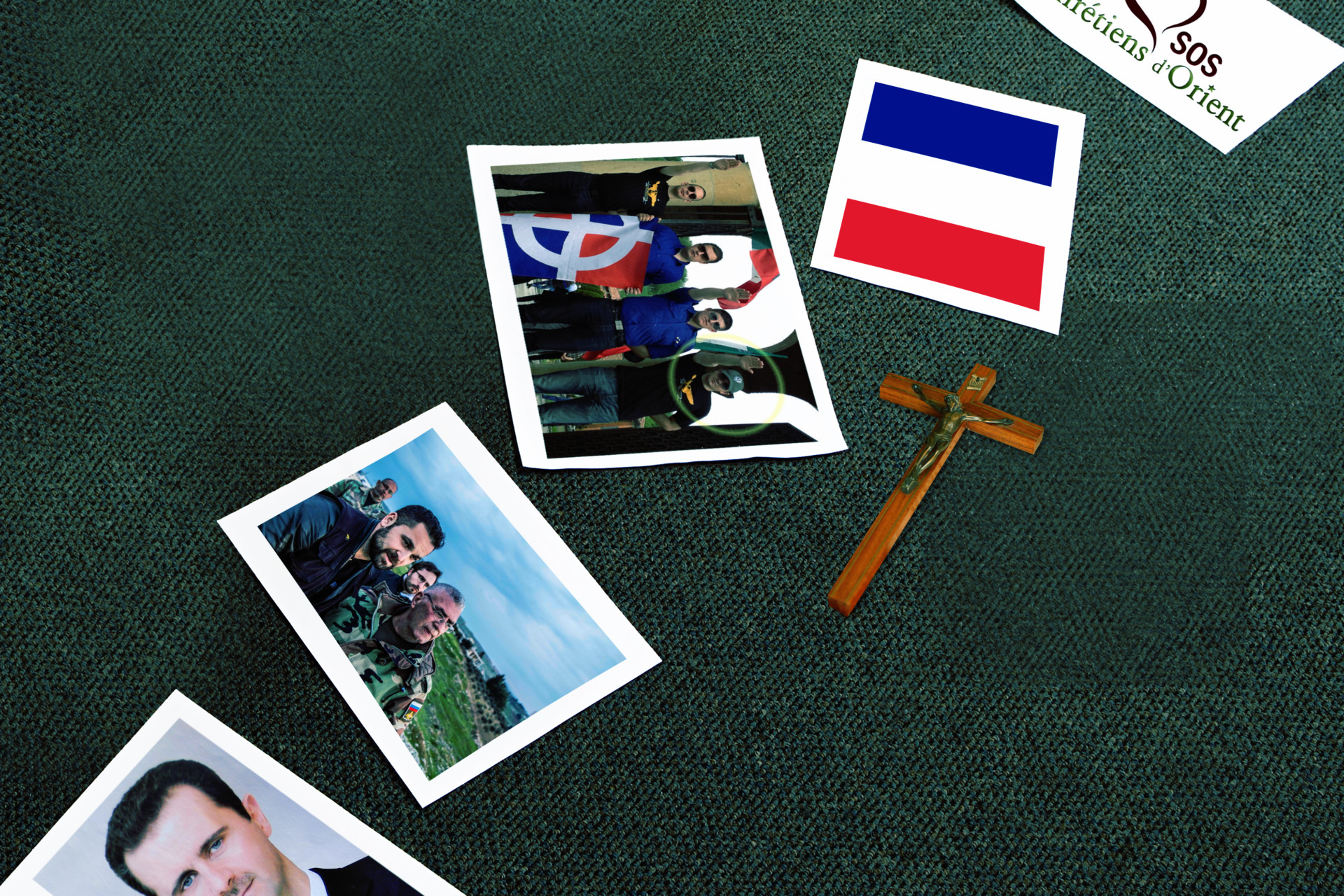A French registered NGO with ties to France’s military and the political far right appears to have funneled money directly to a Syrian militia that supports the regime of President Bashar al-Assad and is accused of committing war crimes, New Lines has learned in an exclusive investigation. The alleged act violates international and French law.
Evidence gathered over the 18-month multicountry investigation includes leaked documents, confidential testimonies from whistleblowers, and open-source information that — when pieced together — appear to show a close working relationship and ongoing support and fundraising efforts in France by the NGO, known as SOS Chrétiens d’Orient (SOSCO), for pro-Assad militia since 2014. The evidence also includes a documented money trail that meets the threshold of prosecutable offenses under French law, according to legal experts who examined the file.
“The financial link is key. It’s the ‘smoking gun,’ the piece of evidence that links SOSCO with money given to the militia,” Paris-based human rights lawyer Laurence Greig told New Lines during a phone call after spending several days examining evidence, adding that she has enough to initiate a legal complaint against the organization in French courts. “And any witnesses who want to testify — we can arrange an anonymous testimony for their protection.”
The investigation also links SOSCO to a list of organizations identified in a letter written in April by U.S. Rep. Elissa Slotkin, chair of the House Homeland Security Committee, asking U.S. Secretary of State Antony Blinken to designate them as overseas violent white supremacy groups that “meet the necessary criteria as Foreign Terrorist Organizations.” The list includes the white extremist group Generation Identity, a European neo-Nazi youth movement that originated in France in 2012 (but has since dissolved), which shares a co-founder with SOSCO.
Up until last year, SOSCO was designated a “partner” of France’s Ministry of Defense, a privilege usually reserved for companies like high-tech defense contractors. SOSCO was the only NGO that worked in the Middle East with this status from 2015 to early 2020, when the Ministry informed New Lines in an email that it had ended this partnership without giving further explanation.
Yet SOSCO has long maintained close ties with France’s political far right. Its director of operations, François-Xavier Gicquel, was expelled from France’s far-right party Front National in 2011 after he was photographed giving “Sieg Heil” salutes. SOSCO’s co-founder Charles de Meyer is parliamentary assistant to far-right politician Thierry Mariani, of Marine le Pen’s Rassemblement National party, who is leading in the polls in the southeast regions of France in the upcoming elections on June 20.
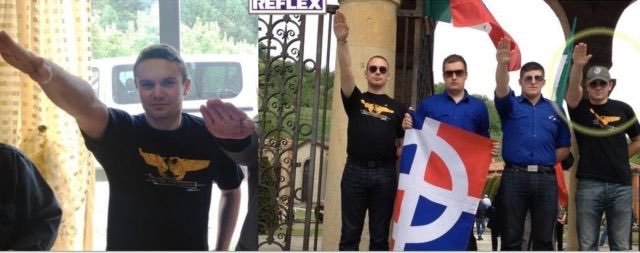
Allegations of SOSCO’s misconduct have also compelled many Syrian Christians — the very community the NGO claims to be helping — to accuse it of misappropriation of funds away from its promised humanitarian aid, false advertising during its fundraising campaign, and inflaming religious and sectarian tensions between Syrians during the country’s brutal war.
“The political narrative was that Assad protected minorities, and this was a strong narrative,” Dr. Samira Mobaied, Paris-based vice president at Syrian Christians for Peace, an international NGO that has raised the alarm with the French authorities against SOSCO, told New Lines during an online conversation.
The Assad regime has positioned itself as a “protector of minorities” since the early days of Syria’s uprising-turned-war, when Assad labeled peaceful protesters as “terrorists” and proceeded to escalate the use of lethal force against them. As the war spread, regime propaganda pitted the dominant Sunni Muslim rural population, which openly opposed Assad, against the country’s religious minorities whom he has claimed as his own staunch allies. Yet the regime has brutally imprisoned and tortured Christians and other religious minorities who opposed him.
“SOSCO exploited this religious false and divisive narrative, and this dynamic has had an adverse effect on creating a schism along religious or sectarian lines,” said Mobaied, adding that her organization has observed SOSCO’s aggressive fundraising campaigns in France and “followed the money” to ascertain how much of it was going to the charitable causes that SOSCO claimed to be supporting in Syria.
We would follow the money to a hospital, for example, that SOSCO claimed to be raising money for in France, only to discover that very little money or equipment had been received
“We would follow the money to a hospital, for example, that SOSCO claimed to be raising money for in France, only to discover that very little money or equipment had been received,” she said. New Lines spoke to witnesses in the Christian community in Syria, including members of local churches, who echoed Mobaied’s critique of SOSCO’s conduct.
The unsavory relationship between SOSCO and the Assad regime, as well as a brutal pro-Assad militia based in Syria’s Hama province, has been documented in French media since SOSCO began its work in Syria in 2013. Last year, an investigation funded by Journalismfund.eu and co-published by Mediapart and Bellingcat delved deeper into this relationship but stopped short of providing the “smoking gun” required to elevate SOSCO’s alleged misconduct to an illegal offense pursuable in French courts.
Newlines’ investigation appears to show SOSCO funneling hundreds of thousands of euros annually from France and elsewhere to Syria with the appearance of circumventing international sanctions on Syria by transiting the funds through intermediary financial institutions located in Iraq and Lebanon, where SOSCO has regional offices. The more damning pieces of evidence that allegedly link SOSCO directly to the pro-Assad militia accused of committing war crimes are invoices leaked to New Lines by a whistleblower. These invoices include some that were apparently faked to fool auditors in France, who stated during routine public hearings (mandated in France for non-profits) that they had found SOSCO’s financial records to be “unverifiable.” This, combined with gathered testimony, appears to document the direct exchange of approximately 46,000 euros ($56,000) in cash from SOSCO into the hands of Simon al-Wakil, a militia commander of one of the Assad regime’s notorious National Defense Forces (NDFs), based in the predominantly Christian town of Mhardeh.
NDFs consist of Syrian youth initially recruited and armed by the Assad regime under the guise of keeping law and order and defending local neighborhoods during Syria’s brutal war. But months into the war, NDFs throughout Syria were mobilized to join the Assad regime’s army in carrying out military offensives inside rebel-controlled areas. In 2019, many NDF militias, including the one with whom SOSCO has a close relationship, were formally folded into Russian-backed Syrian military units. Prior to that — and as early as 2012 — many militias were receiving military training and monthly salaries in cash from Iran’s Islamic Revolutionary Guard Corp (IRGC).
New Lines gathered open-source photographs and social media posts that document the close ties between al-Wakil’s militia and the IRGC, including a photo in which he poses with IRGC Quds Force commander Maj. Gen. Qassem Soleimani, who was killed in Iraq on Jan. 3, 2020, by a U.S. air strike. Open-source information also shows al-Wakil’s tight-knit relationship with Russian commanders based in Hmeimim. In early 2020, al-Wakil and his associate Nabeul al-Abdullah, head of the NDF of Suqaylabiyah, both received a new “Loyalty Medal” from the Russian troops garrisoned at the Hmeimim air base.
Mobaied said that SOSCO openly normalized the Assad regime’s NDF and withheld information about the militias’ grave crimes and rights violations.
“We saw SOSCO’s media campaigns — a way of normalizing these militias, to spin them into a positive light and seed hatred in society. What they’ve advertised and shown was not the reality at all,” she said. “Firing guns from the monastery grounds has a very negative effect on society and communities and interfaith relations,” she added, referencing the artillery positions on the grounds of the Saint George Monastery in Mhardeh, where al-Wakil’s NDF militia and other Assad regime troops fired heavy artillery at townships below.
New Lines reached out to al-Wakil directly and through a liaison for this story but received no response despite numerous attempts.
The investigation further documents myriad past and ongoing war crimes allegedly committed by al-Wakil’s militia during its relationship with SOSCO. According to the lawyer Greig, this additional evidence — combined with the “smoking gun” that allegedly links SOSCO to al-Wakil’s militia — also allows the French judiciary to prosecute al-Wakil and his militia for alleged crimes against humanity, even if in absentia.
“I think we have enough, like war crimes ‘scenes’ allegedly committed by al-Wakil. We have elements of SOSCO’s complicity, how SOSCO was working with him over there,” she said, adding that she plans to move forward with the legal case. “We would start by initiating the complaint in court against SOSCO. The Syrian militia can be prosecuted in absentia. We have enough to open an investigation against them.”
The investigation also raises questions about the extent to which — if at all — SOSCO personnel who also happen to be French military reservists might have provided al-Wakil or his militia, purposely or inadvertently, with military or field strategy advice during the seven years of SOSCO’s visitations to, and fundraising efforts for, the town of Mhardeh.
One such military reservist is SOSCO’s own director of operations and far-right activist, Gicquel, whose Sieg Heil pose on-camera was evidently enough to have France’s most reactionary mainstream political party, Front National, expel him from its ranks in 2011. Gicquel provided medical training to Kurdish special forces and members of the Iraqi army, as he openly admits in French media reports.
Social media accounts show dozens of photos of other SOSCO personnel posing with al-Wakil and his militia, who appear in military fatigues brandishing weapons, at various military sites in Hama province and the town of Mhardeh, including on the grounds of Saint George Monastery, which had been turned into a garrison site by the Assad regime, a violation of international law and norms on the protection of places of worship.
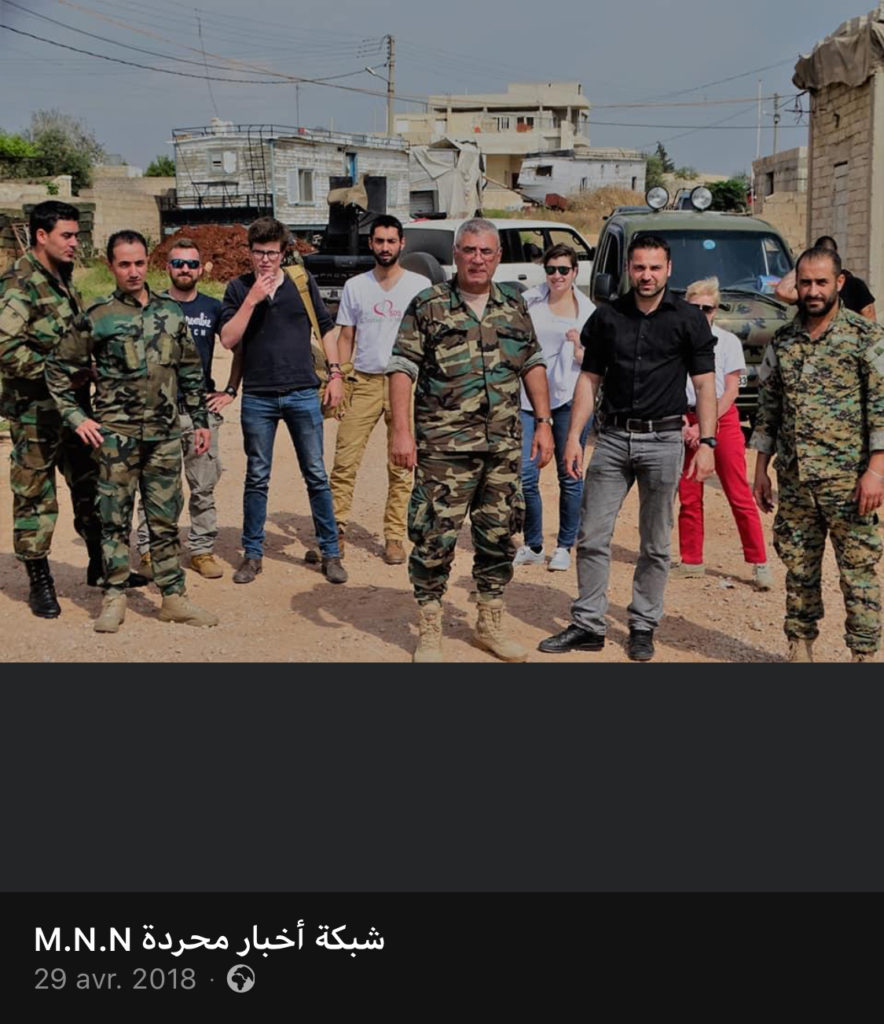
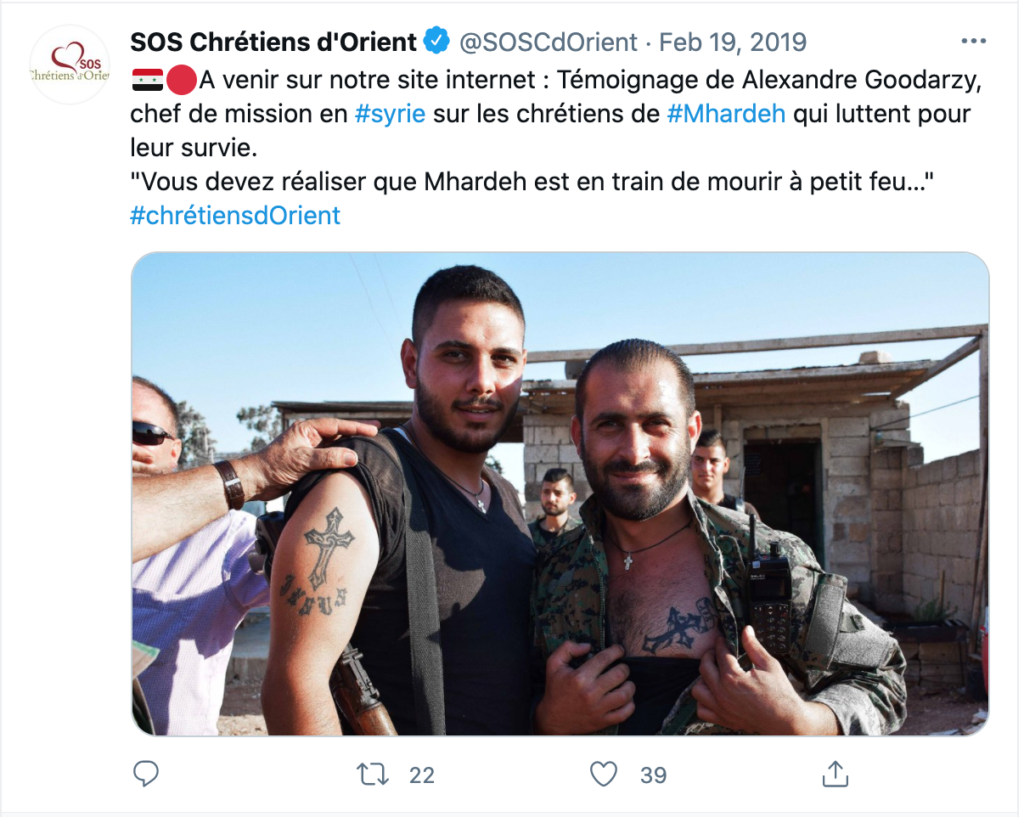
New Lines gathered testimony from Syrians who say they were on the receiving end of the daily bombardment launched by pro-Assad forces, including al-Wakil’s militia, from the garrison guns that had been positioned on the monastery grounds, which sits higher than the targeted “anti-Assad” towns and villages that surround it. These attacks, along with coordinated aerial assaults by the Assad regime and later Russian forces, resulted in the deaths of thousands of people, many of them civilians, who lived around Mhardeh in an agricultural area that was once home to hundreds of thousands of Syrians, many of whom have since been displaced into refugee camps in northern Syria or abroad. The Assad regime and militia, including al-Wakil’s, have also since appropriated for their own use and for the state thousands of acres of farmland that is privately owned by the displaced population with no plan of returning the farms and houses to their rightful owners, who include members of the same Christian community for whom SOSCO claimed to be fundraising in France.
Al-Wakil and his militia also stand accused by members of their own community of the kidnapping and targeted killing of civilians who stood up to them. New Lines has located family members of al-Wakil’s alleged victims and gathered testimony from them. In three cases, victims were identified among the Caesar Files, a collection of thousands of documents and photos smuggled out of Syria in 2013 by a Syrian military photographer who defected after having been tasked with the grim assignment of photographing thousands of bodies that had been tortured and mutilated while in regime custody.
Social media accounts of al-Wakil and his affiliates and the accounts of SOSCO have written numerous posts praising each other and the “strong relationship” that they have fostered.
To a lesser extent, the investigation also covers the bizarre incident of the kidnapping on Jan. 20, 2020, (shortly after the assassination of Soleimani) of three SOSCO personnel including the organization’s then-chief of mission in Syria and French Iranian national, Alexandre Goodarzy, and their Iraqi translator. The convoy went missing from the vicinity near the French Embassy in Baghdad. The SOSCO personnel and their translator were released unharmed on March 26, 2020, the day that France withdrew 200 troops from Iraq.
Both SOSCO and the French government said in separate statements at that time that no group had claimed responsibility for the abduction and no ransom demand had been made.
New Lines has learned through confidential sources that Iraq’s Iran-backed Hezbollah militia was behind the kidnapping. It is not clear to what extent, if any, the kidnapping and release might have been used as leverage to compel the French government to withdraw its forces from Iraq, a move that France has officially attributed to the COVID-19 pandemic.
New Lines repeatedly asked France’s Ministry of Armed Forces if its withdrawal of troops was in any way linked to the kidnapping of SOSCO personnel but received no response.
SOSCO was set up in France in October 2013, shortly before its first mission, dubbed “Christmas in Syria.” Its stated purpose was to provide help to Christians in the Middle East as parts of the region were becoming increasingly embroiled in post-Arab Spring violence. But early in its formative days, SOSCO veered away from providing Christian communities with the humanitarian aid and moral support it originally advocated to peddling a right-wing political agenda and spreading misinformation, according to the organization’s original founder, Olivier Demeocq, who is now estranged from SOSCO. In an interview, Demeocq lamented the use of “false advertising” by his top operatives as early as the “Christmas in Syria” days.
“Upon their return from Syria, they (falsely) claimed that Christians had been beheaded,” Demeocq said, adding that they knew this information to be false.
“When I raised the issue, they told me it would help with the fundraising,” Demeocq added.
Since its launch, SOSCO has led hundreds of fundraising drives in France and through allies located in other countries, as well as on the organization’s social media accounts where anyone can donate.
In November 2019, SOSCO appears to have leveraged its “partnership” status with the Ministry of Armed Forces by hosting a fundraiser in the prestigious Turenne Room of the Army Museum in Paris, a facility belonging to the Ministry.
In some of the fundraising leaflets that SOSCO circulated privately to favored donors, it makes no attempt to disguise that money raised goes directly to support the armament and activities of militias.
“To defend their village, youths have joined the ranks of the NDF. …SOSCO has sent to Mhardeh several of its volunteers,” the leaflet reads. New Lines has also learned that SOSCO gave money to the families of “martyred” militia members in Mhardeh, including families of child soldiers who had been recruited by al-Wakil from the same community that SOSCO purports to protect.
“Christian resistance fighters are putting their lives on the line to save others,” the letter circulated on Jan. 31, 2017, stated. “Any help you can give them will be a source of relief for their families.” The leaflets featured the insignia of the Assad regime’s NDF and a war story shared by a militia member who recounted an offensive. “Any donations made to SOSCO entitle you to a significant tax reduction,” the leaflet said.
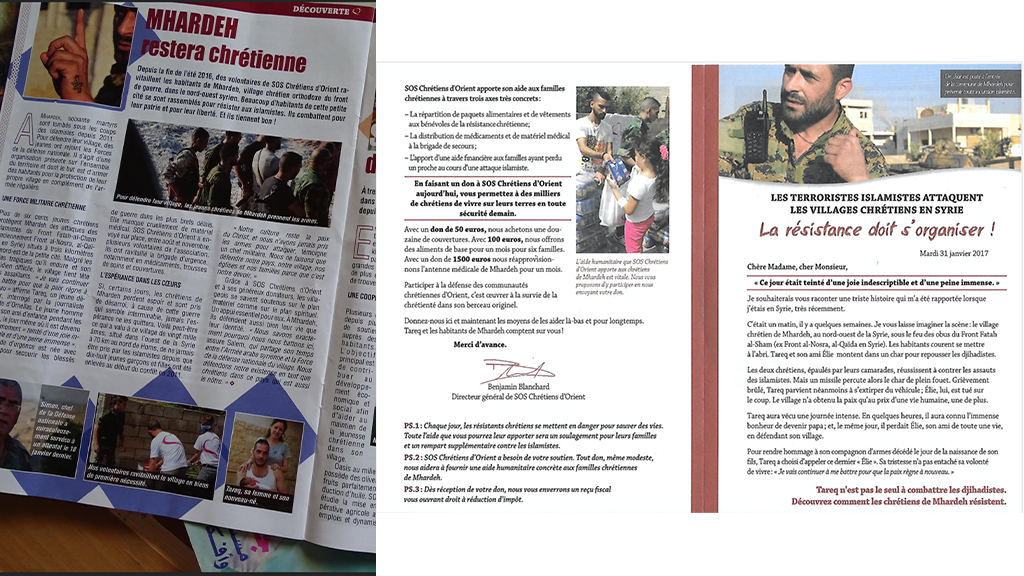
Goodarzy and SOSCO did not respond to several attempts to contact them for this investigation.
In one video posted on social media in 2019, al-Wakil and Goodarzy appear to be standing with a child as al-Wakil addresses the camera, smiling. “Hello, dear people from Lyon, and greetings to our French friends. I thank them for their help here in Mhardeh, the peaceful Christian city,” he says in Arabic, with French subtitles.
SOSCO fundraising campaigns for Mhardeh were apparently so successful that “everyone turned a blind eye despite knowing this was contrary to humanitarian law,” a former SOSCO employee said.
New Lines has acquired an uncirculated report written by a researcher for Western defense contractors and the international coalition. The report, based on detailed interviews with sources in Iraq, Syria, and Lebanon, paints a damning picture of SOSCO funneling money from international donors, mainly in France, to Assad regime militias with impunity, which the report alleges was something of an “an open secret.”
“There is a close relationship between Simon al-Wakil (in Syria) and SOSCO — Alexandre Goodarzy, in particular … who secures the arrival of money into Syria,” the report states. “Several countries send financial support to the city of Mhardeh, which all gets funneled to Simon al-Wakil, (who) has sent reports to the foreign affairs ministries of the following countries (France, United-Kingdom, Sweden, United States, Switzerland) on the situation of Christians and of the region in general. But these countries know that this support goes to armed groups. The country al-Wakil’s militia draws the most money from is France, followed by the United-Kingdom. The money comes from Christian charities, who are aware it goes to military operations,” the report concludes.
In order to funnel money where the international financial system no longer operates due to sanctions, SOSCO had to transit its funds in financial institutions in other countries, namely Iraq and Lebanon, where it has regional offices. From there, SOSCO “volunteers” acted as cash mules, stuffing cash into envelops and carrying them on their person across the border into Syria, according to testimony gathered by New Lines from whistleblowers.
It is not clear if these “volunteers” were able to use what is known as the “VIP” or “military road” that links Lebanon and Syria by circumventing the border crossing, but witnesses inside Syria have said that SOSCO personnel “traveled with Syrian military and intelligence escorts once they were inside Syria,” especially during their numerous trips on the highway from Damascus to Hama province, where they met with al-Wakil and at least one other NDF commander known as Nabeul al-Abdullah in the town of Suqaylabiyah.
In an email apparently authored in 2016 and later leaked to New Lines, a SOSCO employee raised the alarm to upper management over the “traceability” of the organization’s funds — to the tune of 20,000 to 30,000 euros ($24,000 to $37,000) per month — once the money was given to the cash mules. The email also raised concern over the personal risk assumed by the cash mules who transported thousands of euros at a time.
Mobaied, whose Syrian Christian organization was one of the first to blow the whistle on SOSCO’s alleged activity in Syria, said that SOSCO’s advertising campaign was cynically couched in the language of protecting an embattled minority in a war zone. Yet it was a deeply ideological enterprise that supported a pro-Assad militia that was committing war crimes. “SOSCO used false advertising in raising money,” Mobaied said, “and the French taxpayer had no idea. Well-meaning people who wanted to help civilians in Syria had no idea.”




